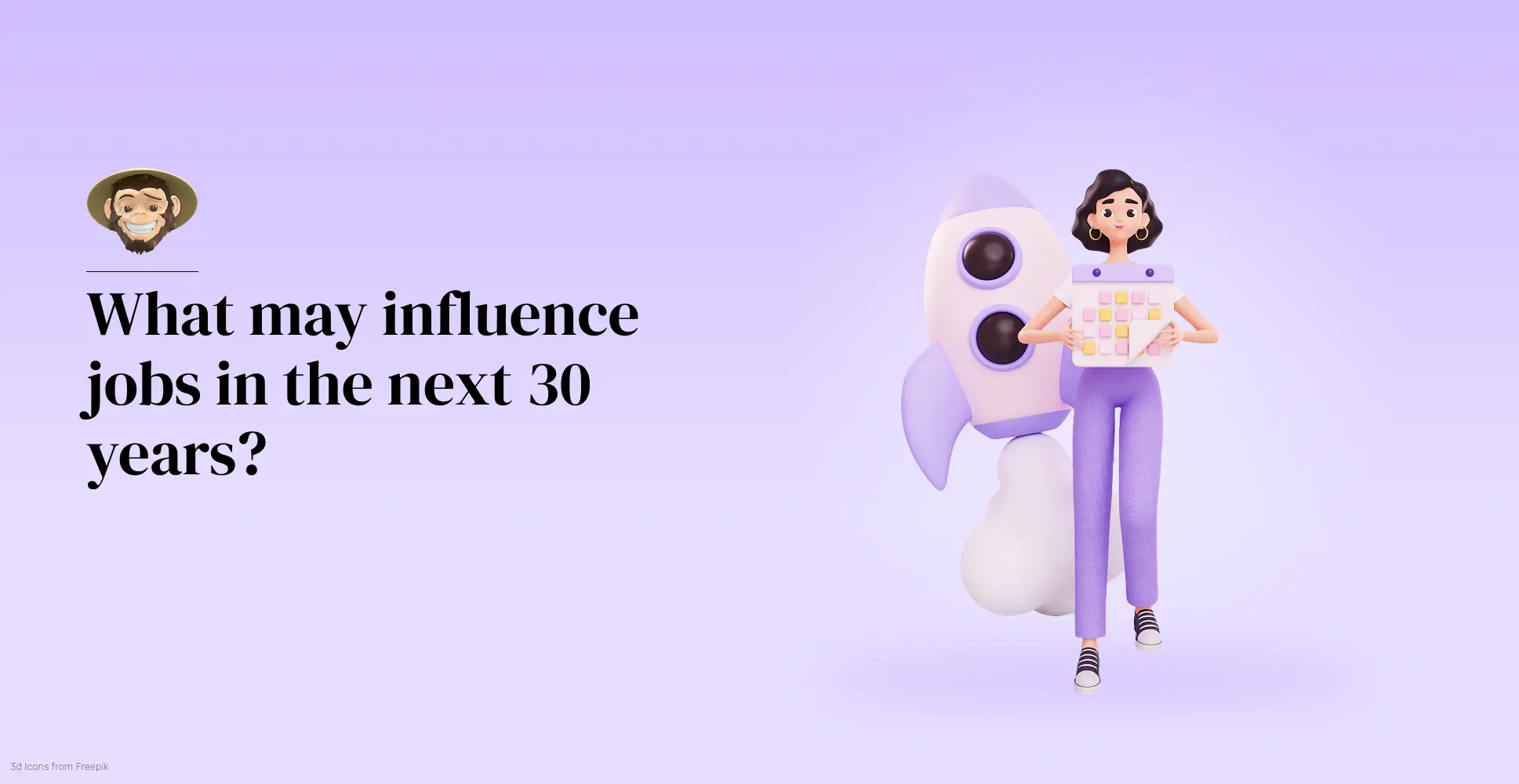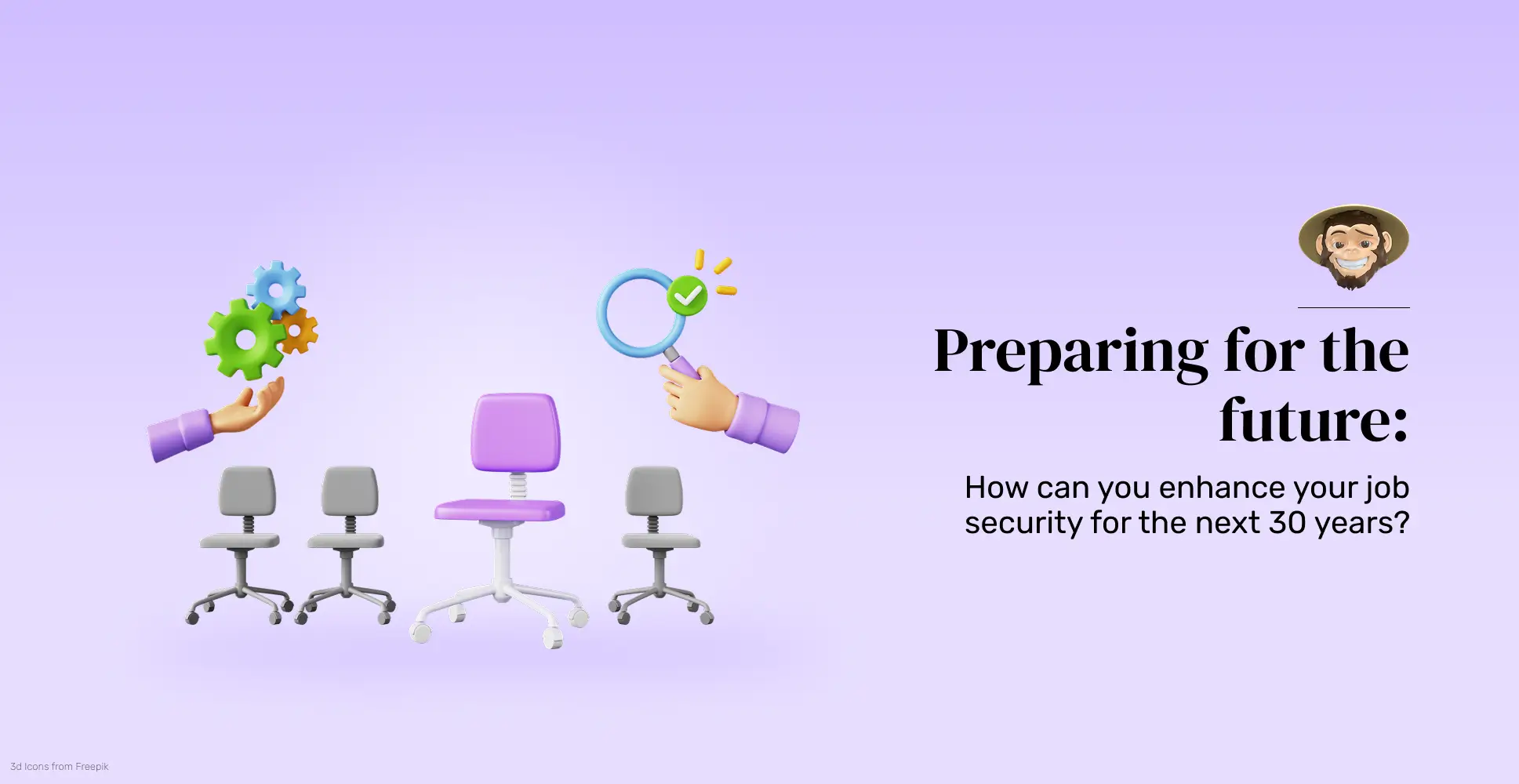How we work has changed dramatically in the last couple of decades, and it will continue to advance and shift as time passes. The key to thriving in this ever-evolving landscape is continuous adaptation and learning.
Throughout history, the way we work has always been subject to change. Shifting political climates, religion, tech innovation, and industrial revolutions have been the catalysts of some of the most drastic modifications that influenced how humans worked. Now, we find ourselves on the brink of another era of change. It’s not a matter of if but when: we are on the verge of a new technological revolution. Everything around us is in flux, and everyone is swiftly adapting to this new tech-driven universe we call modern life. Global economic shifts, workforce changes, and evolving societal trends are rapidly growing and influencing our jobs, leaving us with the pressing question: Will my job still exist and be relevant in the coming decades?
As artificial intelligence, automation, robotics, and other emerging technologies advance at neck-breaking speeds and take hold of the global job market, some concerns about job displacement and skills redundancy arise–the future of work will likely look dramatically different from what we know today. Let’s explore the factors that will influence jobs in the next 30 years, discuss what the future holds for various professions, and how you can prepare to stay competitive in a world where jobs are continuously evolving.

What may influence jobs in the next 30 years?
Technology’s role in the workplace, particularly AI and automation, has become increasingly prominent as we learn to navigate the digital age. These technologies are the driving force behind various key trends that fundamentally change how and where we work and significantly influence the types of work that will increase or fall in demand in the upcoming decades. Here are some of the most significant trends that are redefining the future of work:
1. AI and automation: In most industries, AI and automation are already replacing humans in performing manual and repetitive tasks. However, as they continue to evolve, they also open up new opportunities for AI development and robotics workers, among others. For some, this potential for job creation can inspire optimism about the future of work.
2. Remote work: Technology has made it clear that some workers can better perform their tasks remotely. This not only increases the flexibility and well-being of some positions but also leads to significant cost savings and environmental benefits, providing a reassuring outlook for the future of work.
3. Reskilling: Technological advancements inherently require workers to continually update their skills to remain relevant in the job market.
4. Mental health: Employee well-being is quickly becoming a top priority for organizations worldwide. Mental health resources, flexible working hours, recognition of work-life balance as crucial for productivity, and wellness programs are some of the initiatives that are becoming commonplace in corporate structures across the globe.
5. Sustainability: With environmental concerns becoming increasingly urgent, businesses are taking the lead in reducing carbon footprints. This proactive stance is creating more ‘green jobs’ focused on environmental conservation, renewable energy, and sustainable business practices, offering new opportunities for workers.
Given these factors, and others we won’t discuss today, that are swiftly reshaping the job market, workers need to adapt and prepare for this shift. They can continue to be invaluable in the workplace by upskilling and staying relevant.

Which jobs are most at risk?
While technological advancements have the power to create new job opportunities, it’s also important to note that some job categories and sectors are more vulnerable to disruption than others. Here are the main ones.
1. Data entry: The increasing adoption of automation, artificial intelligence, and machine learning is impacting data entry and other repetitive manual tasks. These technologies are being used to replace humans in performing these tasks, which are often time-consuming and repetitive.
2. Customer service: AI-driven technologies such as chatbots and virtual assistants are already replacing human customer service representatives, especially for simple, repetitive tasks.
3. Manufacturing: Automation is already streamlining cumbersome processes inside production lines, with robots and intelligent machinery working tirelessly and with impressive precision, reducing the need for human labor in manufacturing.
4. Some areas of transportation and logistics: AI-based autonomous vehicles and drones are already starting to replace human drivers, a trend that is only expected to grow and likely will impact long-haul truckers and warehouse workers in the upcoming decades.

Jobs that will thrive in the next 30 years
Luckily, certain professions are likely to emerge unscathed because they require unique human skills such as creativity, emotional intelligence, leadership, and complex problem-solving.
1. Healthcare providers: Doctors, nurses, surgeons, and other healthcare workers are in high demand and will likely continue to be, especially as populations age. While AI and other technological advancements can be extremely useful in imaging, diagnostics, robotic surgeries, and remote monitoring, human healthcare providers are and will remain critical to handling complex cases, empathizing with patients, and providing emotional and mental care, all of which are currently irreplaceable.
2. Teachers: While AI can undoubtedly enhance and supplement education in some scenarios via e-learning platforms and other AI-based tools, it can not replicate the critical role that human educators play in mentoring, motivating, and guiding students. The role of a teacher is very nuanced and extends far beyond simply imparting information; teachers help shape character, navigate complex social and emotional landscapes, and provide human connection, which is fundamental to education.
3. Creative professionals: Creativity is uniquely human, and while AI has shown impressive capabilities in generating content, it still lacks the originality, depth, intention, empathy, and human touch that professional creatives bring to their work. AI may be able to produce content, but it cannot truly understand the human experience or bring the same level of emotional depth to a project.
4. Leadership roles: CEOs and project managers’ expertise in decision-making, strategic thinking, and negotiation is irreplaceable. While AI can streamline workflows, it cannot fully replicate the human touch in tasks that require coordination, communication, and problem-solving. Their leadership is indispensable and will likely remain that way.
5. Social workers: Social workers are invaluable in managing social challenges such as poverty and addiction. The empathy, engagement, compassion, and problem-solving skills they bring to their work are unique to humans and, thus, irreplaceable by machines.

Preparing for the future: how can you enhance your job security for the next 30 years?
While it’s nearly impossible to accurately predict which specific jobs will still exist in 30 years, not all is lost. First, you must understand that the key to job security does not lie in clinging to the status quo and hoping things don’t change but in embracing that change and diving into continuously learning, adapting, and taking a proactive approach to your career growth. This is critical to develop your uniquely human and professional skills and to complement rather than compete with technology, which, let’s face it, is impossible. In that sense, your goal shouldn’t be to secure your current job. Instead, you should strive to ensure you remain employable and professionally relevant regardless of how much technology advances (and it will).
So, even if your job may or may not exist in its current form by 2050, you can be proactive and set yourself up for success in the job market of the future by staying adaptable, developing a diverse skill set, staying on top of technological shifts and advancements, and overall, keeping a future-oriented perspective.
During our over ten years of experience in app development, we have learned to remain relevant and adaptable to technological change. This has made us a capable and robust app development partner who can answer your questions and make your ideas come true. So, if you have any questions or want to work with us, let’s talk!
